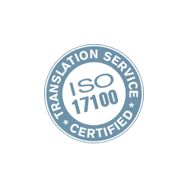How To Choose A Translator
Getting accurate translations can save a lot of issues for your business (just see these funny marketing mistranslations for evidence!).
If you don’t speak the target language you want to translate into, how will you know you’re going to avoid a mistranslation fail? The answer: choose your translator wisely!
In this post, we’ve outlined the key questions you need to ask potential translators before recruiting them for your translation project.

What type of translation solution do you need?
This is an important question to answer as it’ll narrow down your search from here on. Consider the translation project(s) you have in mind. Are they one-offs? Will you be doing something like this regularly? Do you need a quick turnaround?
You’ve got 3 main translation solution options:
- Hiring an in-house translator.
- Hiring a freelance translator.
- Hiring a translation agency.
An in-house translator is best if you have regular translation projects with tight deadlines where the return will be higher than the cost of their annual salary and costs associated with buying translation tools.
A freelance translator is best if you’re on a tight budget but not on a tight deadline. Turnaround times can be slower with freelancers since they juggle many clients – you may find it a bit harder to get in touch with freelancers.
A translation agency is best if you have a tight deadline and have a lot riding on the translation being as accurate as possible. A translation agency has rigorous quality control processes and the means to get the project done as quickly and accurately as possible, which the other options don’t have easy access to.

What are good qualities of a translator?
There are several qualities you should look for in a translator.
Native speakers
Native speakers of the target language are best placed to work on your translation projects. The process of localisation is way more effective when your translator is familiar with local-specific turns of phrase.
Do consider the country they are from vs your target location as some languages are spoken in more than one area – a Spanish speaker from Spain will have different language experience to a Spanish speaker from Venezuela.
Industry knowledge
Consider the industry you’re working in and whether you need someone with specialised knowledge to be able to translate accurately. In the legal and medical fields for example, it’s extremely valuable to have experience translating these types of documents already.
Experience with the translation type
There are different types of translation. Have they translated this type of document before? A translator may have more difficulty translating a book of poetry if they are used to translating instructions manuals for example. Find out what they have worked on and ask for examples of their past work to review.
Accreditations and qualifications
The best work will be done by a trained professional rather than someone who studies languages in their spare time as a hobby. Possessing a degree in translation or gaining a diploma in translation through the Chartered Institute of Linguists are major green flags. Do check if their credentials are all in place before hiring your translator!
Audience relatability
If you’re marketing to Gen Z for example, you’ll want someone who can speak on their level. They’ll be familiar with vocabulary in both the languages and will be able to create a translation more naturally than perhaps someone from Generation X.

Other questions to ask potential translators
Here are some specific questions you should ask potential translators to see if they are a good fit for your project and business.
How much do they charge?
Ask them how they calculate the costs of the project. Some specific questions you’ll want to ask include:
- What do you charge per word?
- Do you offer a price reduction for redundant translations?
- What is your charge for revisions?
- Do you charge for expedited projects?
Can you provide me with references?
Ask them for some references from previous clients. If they have an online presence, you can also look at their online reviews (for example Google Reviews, TrustPilot, Feefo, Facebook).
Where are you located – how easily can I get in touch?
You’re unlikely to need to meet with the translator in person, unless they live close enough that an in-person meeting makes sense. You should check where they are based and how your time zones align. It’ll be frustrating if there is an 8 hour time difference and you have to wait for the following working day to get in touch!
What quality control processes do you have in place?
Having a couple of sets of eyes on the project will improve the accuracy of the completed work. Do they have scope to have someone else cast their eyes over the translation? And if so, will you be charged extra for this?
Does the software they use help them keep their work as error-free as possible? What other measures do they take to catch mistranslations and odd turns-of-phrase?

Conclusion
Global Language Services is a translation agency with offices in Glasgow, Edinburgh, and Inverness. Our team of highly skilled translators and interpreters have collective expertise in over 85 languages. We’re experienced in translating in all major industries, including manufacturing, advertising, healthcare, tourism, food and drink, education, and more.
If you need help with a translation project, please get in touch with us today! You can use this blog post to vet whether we are a good fit for your project!





